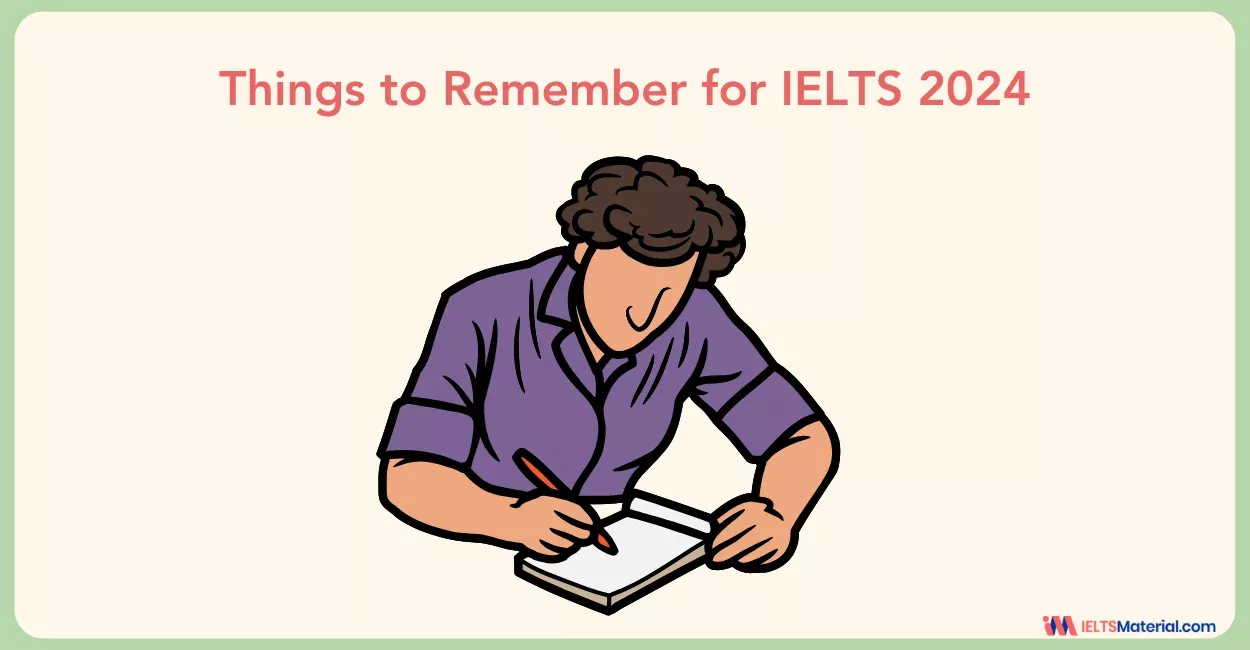Things to Remember for IELTS 2024
4 min read
Updated On
-
Copy link
.
Table of Contents
- Receive input on your writing.
- Don’t use complicated words that you don’t understand
- In your writing, use more transitional devices.
- In the listening section, be prepared for foreign accents.
- Perfection comes with practice.
- Keep track of your language learning progress.
- Keep track of the number of words you’ve written.
- Progress can be helped by enthusiasm.
- Conclusion

Limited-Time Offer : Access a FREE 10-Day IELTS Study Plan!
The IELTS exam is an English proficiency test used to determine your eligibility to relocate to a country where English is spoken. If you wish to study or work at the University of Chicago, the University of Harvard, or countless other prestigious universities or countries, you must take this test.
The purpose of the test is to ensure that you can follow and understand the English-language lectures and fit in well with the other students.
The IELTS test is used to assess your reading, writing, listening, and speaking abilities in English. Preparing for this exam takes significant time and effort. If you’re short on time, though, you may strategize and plan ahead of time.
So here are some things to remember for IELTS 2024.
Receive input on your writing.
Getting feedback on your writing is, by far, the most important stage in getting ready for the IELTS written section. You might chat with someone who has taken the test and received a good grade, or you could ask a teacher or relative who is fluent in English or a native English speaker for help.
Instead of trying to impress the audience, the objective is to identify your strengths and weaknesses. Knowing which areas of your writing skills need the greatest improvement makes the challenge easier.
If you want to be in the student accommodation of Harvard University by the next admission session, take this advice seriously.
Don’t use complicated words that you don’t understand
The most frequent error IELTS candidates make is using a complex vocabulary in the false belief that doing so will help them score well. You run the risk of employing phrases incorrectly when you utilize ones that you don’t completely understand. You will consequently receive a lower grade on the writing and speaking sections.
In your writing, use more transitional devices.
Keep practicing your writing principles when you’ve mastered them. Using transitional devices is one strategy (also known as connectives). When writing, you might have to go from one idea to the next. To provide a constant flow of information without upsetting the reader, transitional gadgets are used.
A single word (meanwhile, hereafter, therefore, etc.), a phrase, or even an entire paragraph might serve as a transitional device. However, due to the word limit on the exam, it is recommended to connect different parts of your topic using single words or brief phrases.
In the listening section, be prepared for foreign accents.

In the listening exam, the candidate will hear a range of accents, according to the British Council. That means you’ll have to get used to British, American, Canadian, and Australian accents.
So, for a month, pay heed to the IELTS Listening audio recording, and you will not feel any accent uncomfortable or challenging to comprehend.
Plus, it will be good practice when you move into your new student housing in Oxford next fall and meet your new overseas classmates.
Perfection comes with practice.
You will become more adaptable to the IELTS questions if you practice every day. Studying every day doesn’t mean you have to stare at your practice book all of the time; instead, you may study IELTS from a variety of platforms in a more engaging way.
Keep track of your language learning progress.
To keep track of your learning, get a logbook or create a file on your computer or phone. Create a list of the definitions of words you find challenging to understand and note anything new you learn.
Not only will having a detailed record to read over enables you to reflect on your progress, but it will also make it simpler to remember new ‘Vocabulary’.
Keep track of the number of words you’ve written.
For Task 1, candidates must write a 150-word response, and for Task 2, they must write a 250-word response. If you don’t write more than the word count, you’ll lose marks.
Even if you are only a few words short of the word count, you eventually lose marks. There is no word count cap on how many you can write.
IELTS advises writing between 160 and 180 words for Task 1 and 260 to 280 words for Task 2. As a result, you won’t lose points for writing too little or for including too much information. Pro tip: Give quality precedence over quantity.
Know how to count the words by lines rather than individual words to save time on the major test.
Progress can be helped by enthusiasm.
You’ll be surprised at how much of an influence having a positive outlook can have on your learning. Putting yourself across as someone who speaks English well might give you more self-assurance and make it easier for you to apply what you already know.
Take chances and don’t be deterred if you fail; mistakes help you learn more.
Conclusion
Studying is the most crucial of all the IELTS Tips and techniques we can provide, so get started now before signing up for the exam!
We hope this article helps you in your preparation for IELTS 2024.
Explore IELTS related articles

Start Preparing for IELTS: Get Your 10-Day Study Plan Today!
Recent Articles

Nehasri Ravishenbagam

Nehasri Ravishenbagam

Haniya Yashfeen






Post your Comments